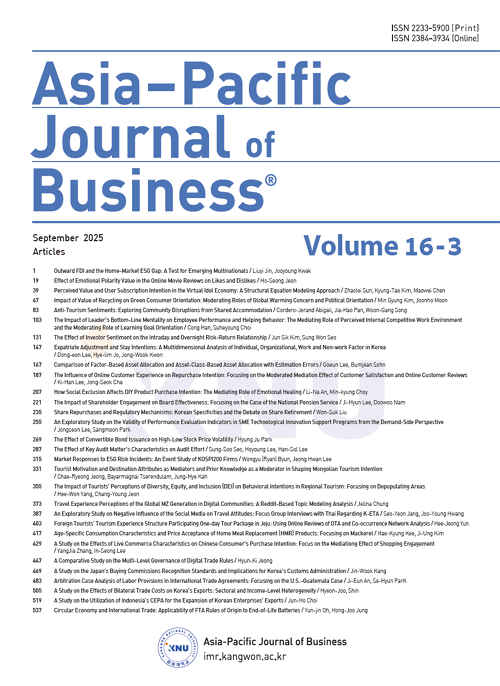순환경제와 국제무역: 사용후 배터리를 중심으로 FTA 원산지 규정 적용 가능성에 대한 고찰
Circular Economy and International Trade: Applicability of FTA Rules of Origin to End-of-Life Batteries
- 강원대학교 경영경제연구소
- 아태비즈니스연구
- 제16권 제3호
-
2025.09537 - 553 (17 pages)
-
DOI : 10.32599/apjb.16.3.202506.537
- 0

Purpose - The purpose of this study is to examine the applicability of Free Trade Agreement (FTA) rules of origin to end-of-life (EOL) batteries within the framework of the circular economy. In particular, this study aims to analyze how recycling, reuse, and remanufacturing of EOL batteries are treated under preferential trade agreements, and to identify limitations and policy implications for Korea and other economies pursuing sustainable trade strategies. Design/methodology/approach - This study adopts a qualitative and legal-institutional analysis based on FTA texts, HS classification rules, and policy documents. Comparative analysis is conducted across major FTAs (e.g., Korea-US FTA, Korea-EU FTA, Korea-Canada FTA, RCEP) to examine the treatment of waste, scrap, and remanufactured goods. In addition, policy reviews of Korean legislation such as the Framework Act on Carbon Neutrality and Green Growth (2022), the Act on Transition to a Circular Economy (2024), and the proposed Act on Fostering the End-of-Life Battery Industry (2025) are incorporated to contextualize domestic strategies. Findings - The analysis reveals three key findings. First, EOL batteries recycled for material recovery are generally recognized as “wholly obtained goods” under most FTA provisions, thereby eligible for preferential treatment regardless of the origin of input materials. Second, reused or remanufactured batteries retain their original function and HS classification, and thus rarely meet the wholly obtained criterion or the product-specific rules of origin (PSR), creating structural limitations in FTA utilization. Third, some agreements (e.g., Korea-US FTA, Korea-Canada FTA) introduce exceptions for remanufactured goods, but the scope remains narrow and fragmented across agreements. Overall, the current rules of origin reflect a linear economic paradigm and fail to fully accommodate the characteristics of circular economy products. Research implications or originality - This study contributes to the emerging literature on the intersection of the circular economy and international trade by highlighting how FTA rules of origin interact with recycling, reuse, and remanufacturing practices. The findings underscore the need for revising origin criteria to better reflect circular economy realities, such as explicit definitions of remanufactured goods and expanded recognition of reused products. For Korea, strengthening institutional support for the EOL battery industry and aligning FTA rules with circular economy objectives are crucial for enhancing trade competitiveness and achieving sustainable growth.
Ⅰ. 서론
Ⅱ. 이론적 배경
Ⅲ. 순환경제로의 전환과 우리나라 추진 동향
Ⅳ. 사용후 배터리와 FTA 활용
Ⅴ. 결론
References
(0)
(0)